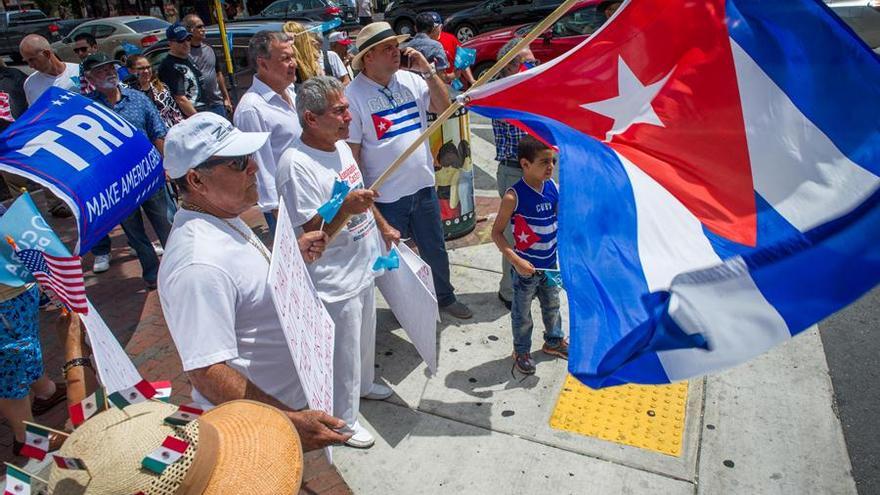
![]() 14ymedio, Mario J. Pentón, 19 April 2018 — In the city with the largest Cuban population after Havana, the appointment last Thursday of Miguel Díaz-Canel as president of Cuba took no one by surprise. As the only candidate for president just the day before, the 58-year-old electrical engineer is hardly unknown in Miami.
14ymedio, Mario J. Pentón, 19 April 2018 — In the city with the largest Cuban population after Havana, the appointment last Thursday of Miguel Díaz-Canel as president of Cuba took no one by surprise. As the only candidate for president just the day before, the 58-year-old electrical engineer is hardly unknown in Miami.
“I don’t care who rules Cuba. The place is a total mess. That’s why I left,” says Elaine García, a 35-year-old Cuban woman who works as a salesperson at a bakery on Okeechobee Road in Hialeah. She arrived from Cuba five years ago and, though she says she maintains her ties to her family on the island, she prefers not to get involved in “politics.”
Díaz-Canel took office without generating large public demonstrations in southern Florida, though there has been a wave of criticism from politicians, activists and non-governmental organizations.
One such organization is Raíces de Esperanza (Roots of Hope), which sponsors programs to support young people on the island. It issued a statement saying it is “hopeful” about the change of leadership in Cuba.
“We believe that today’s transfer of power represents an opportunity for a new generation of Cuban leaders to take concrete measures to promote significant economic prosperity and political reforms on the island,” it says, asking the country’s new chief executive to listen to “Cuba’s youth, from its businesspeople and civil society leaders to artists and students.”
For Ramón Saúl Sánchez, president of Movimiento Democracia, what happened last week in Havana “is an undemocratic handover that should not be recognized by the international community.”
Sánchez told 14ymedio that he called upon Cuban exiles to demonstrate in front of the legendary Versailles restaurant in the heart of Miami’s Little Havana to “condemn the illegitimate transfer of power.”
“I listened to Díaz-Canel’s speach. I would have liked hear a reformist but that was not the case. It was a speech by yet another establishment figure who will not help Cubans obtain their freedom,” he said. He does, however, hold out hope that the situation could change after “the inevitable biological event.”
Activist Rosa María Payá — leader of Cuba Decides, a campaign to hold a binding referendum on a democratic transition in Cuba — accused the government of “disguising its despotism by designating heirs.”
“An heir acting as a front-man for the Castros is not change. Change comes when Cubans can participate and change the system through referendum,” tweeted Payá, who has been the target of a smear campaign by the official press for her recent participation in the Summit of the Americas in Peru.
“The percentages are a sign of totalitarian conformity and the complete absence of democratic engagement in the National Assembly. With a ridiculous 99.83% of the votes going to Raúl Castro’s man, he is now the designated president,” she added.
Cuban-American congresswoman Ileana Ros-Lehtinen also used the social network to say that it does not matter who governs the island because “Cubans continue to suffer and their basic human rights are denied under a totalitarian communist system.”
“The sham transition of power in Cuba does not change the reality of the island’s people or bring them any closer to freedom. Power remains in the hands of Castro’s murderous communist regime,” she said in another Spanish-language tweet.
The prominent anti-Castro congresswoman will retire from the US House of Representatives after a political career spanning thirty-eight years. Ros-Lehtinen has historically been one of the most vocal critics of the Castro government.
Archivo Cuba, an NGO which compiles personal accounts and statistics related to violations of human rights on the island, issued a statement saying that the new government “is a transfer of power in name only, a nominal change within a totalitarian system that continues to carry out serious abuses against Cuban citizens and to ignore their fundamental rights.”
Senator Marco Rubio said in an interview with El Nuevo Herald that he hopes that the community of Latin American countries does not recognize the “fraudulent” succession which has taken place on the island.
“We will see if an organization that was created to defend democracy is ready or not to criticize something that is not democratic. I hope there is a vote on this as soon as possible,” said Rubio in a reference to the Organization of American States.
For his part, the Cuban-American congressman Mario Díaz-Balart recalled Osvaldo Dorticós Torrado, president from 1959 until 1976, the year current socialist constitution was adopted and the office of president was eliminated. During his tenure as head of the government, he had to deal with the constant presence of Fidel Castro as prime minister. Dorticós committed suicide in 1983.
“Just as Fidel Castro made Osvaldo Dorticós president until 1976, Raúl Castro has made Miguel Díaz-Canel president of the Council of Ministers and Council of State. Another Castro puppet,” says Díaz-Balart.
___________________________
The 14ymedio team is committed to serious journalism that reflects the reality of deep Cuba. Thank you for joining us on this long road. We invite you to continue supporting us, but this time by becoming a member of 14ymedio. Together we can continue to transform journalism in Cuba.
